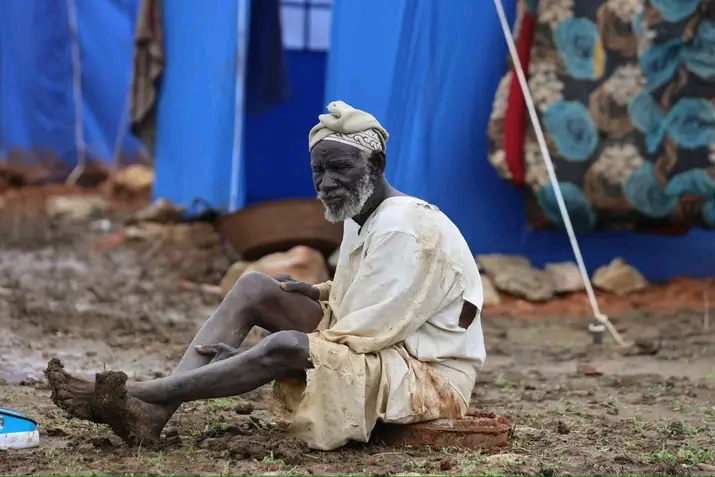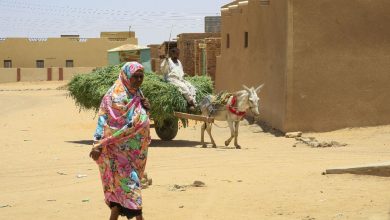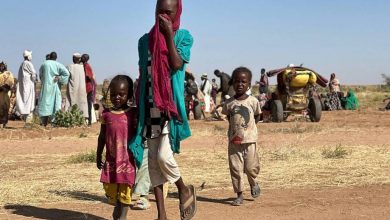Hunger Threatens the Lives of Children and the Elderly in Sudan
Report by: Siddig Al-Dukhri

Despite 26 months having passed since the outbreak of war, Sudanese citizens trapped in the capital’s three cities—Bahri, Omdurman, and Khartoum—as well as those in conflict zones and displacement shelters, continue to endure complex and dire humanitarian conditions. A deepening food crisis, caused by the suspension of free meal distributions and depletion of financial savings, has left thousands—especially children and the elderly—facing the looming threat of starvation.
The suspension of aid, donations, and funding, along with soaring inflation, has led to the shutdown of 80% of charitable kitchens and soup kitchens across the country. Others are barely holding on, facing similar financial constraints. The closure of these vital services threatens to double the suffering of thousands of families who have come to rely on communal kitchens after the conflict destroyed economic activity and livelihoods in many cities and regions.
Famine Warning
The UN Office for the Coordination of Humanitarian Affairs (OCHA) announced that 70% of the 1,400 communal kitchens in Khartoum State have ceased operations due to lack of funding.
It noted that emergency response rooms are providing food, basic healthcare, and other forms of support in several areas across Sudan. However, the shutdown of these operations would put hundreds of thousands of people at greater risk.
OCHA added that partner organizations have provided emergency nutrition assistance to 89,000 individuals in Karari and Umbadda localities in Omdurman, and in other neighborhoods of Khartoum Bahri.
Emergency rooms require $12 million monthly to keep communal kitchens running and to continue delivering services to the Sudanese population.
Severe Hardship
Speaking to Mashawir, Hashim Al-Tayeb, a resident of Kalakla in Khartoum, described the extreme humanitarian hardship they face since free meal services in southern neighborhoods of the capital were suspended. Residents now survive on a single daily meal of boiled grains and legumes known as balila.
He explained that the arrival of large numbers of returnees to Khartoum has worsened the food crisis, and registration of these individuals is no longer feasible due to lack of funding. Most people now rely entirely on the soup kitchens to obtain food.
Al-Tayeb added that the kitchen’s location in a relatively secure area—freed by the army—has attracted large numbers of people from southern Khartoum, further increasing pressure on the limited services provided.
Suffering and Deaths
Naji Mohamed Ali, a volunteer at a kitchen in Bahri locality, described the humanitarian situation as “catastrophic.” He explained that the shutdown of charitable kitchens in all cities of the capital due to halted funding now threatens hundreds of thousands of civilians—mostly children, women, and the elderly—with extreme hunger, which has already led to multiple deaths in various parts of the country in recent weeks.
Ali said kitchen workers are no longer able to provide daily services, risking a worsening food crisis that could severely affect thousands more.
He pointed out that the number of families in need of free food services has grown significantly, especially with the return of large numbers of displaced people to the capital. “We are now facing an extremely complicated reality,” he added.
Crises Facing Returnees
Farouk Hussein, a resident who recently returned to the Al-Salha area of Omdurman, told Mashawir that he and his family arrived at their home under extremely difficult conditions, with no food or clean drinking water. Due to the surge in returnees, local volunteers are now unable to provide full meals to those in need.
He added that many residents had recently depended on food initiatives organized by neighborhoods, and the cessation of those efforts has led to an unprecedented deterioration in living conditions. “If the situation continues, people will die of hunger,” he warned.
“We live under constant pressure,” he continued. “Most days, we have only one meal, and many times, we don’t even have that. We fear for the children and the elderly due to the spread of malnutrition-related diseases.”
Soup Kitchen Funding Crisis
Several emergency room volunteers in East Nile locality of Khartoum Bahri reported that halted support, donations, and funding have been the main obstacles preventing soup kitchens from continuing operations. This has worsened living conditions and pushed residents closer to full-blown starvation.
The local emergency room confirmed that all soup kitchens have ceased operations, and both returnees and those still stranded in the area now share what little they have. The room announced that 150 charitable kitchens have shut down due to lack of funding.
In a statement, the emergency room explained that these kitchens were a lifeline for thousands of families now facing real famine. Meanwhile, epidemics and malnutrition are ravaging those stranded in East Nile locality. The room appealed to national and international organizations for urgent intervention to prevent a full-scale catastrophe.




